
Blue Skies is a 1946 American musical comedy film directed by Stuart Heisler and starring Bing Crosby, Fred Astaire, and Joan Caulfield. Based on a story by Irving Berlin, the film is about a dancer who loves a showgirl who loves a compulsive nightclub-opener who can't stay committed to anything in life for very long. Produced by Sol C. Siegel, Blue Skies was filmed in Technicolor and released by Paramount Pictures. The music, lyrics, and story were written by Irving Berlin, with most of the songs recycled from earlier works.
"Count Your Blessings (Instead of Sheep)" is a popular song written by Irving Berlin and used in the 1954 film White Christmas. It is commonly performed as a Christmas song, although the lyrics make no reference to the December holiday.

"K-K-K-Katy" is a World War I-era song written by Canadian-American composer Geoffrey O'Hara in 1917 and published in 1918. The sheet music advertised it as "The Sensational Stammering Song Success Sung by the Soldiers and Sailors", as well as "The Sensational New Stammering Song" The song was first played at a garden party fund-raiser for the Red Cross in Collins Bay on Lake Ontario. O'Hara was from Chatham, Ontario, and taught music at several universities.
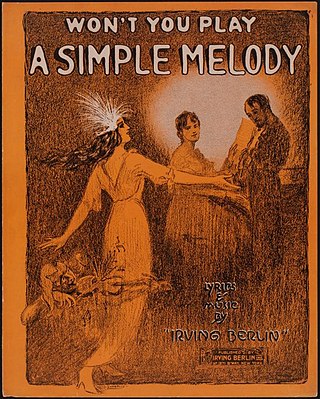
"Play a Simple Melody" is a song from the 1914 musical, Watch Your Step, with words and music by Irving Berlin.

"Moonlight Bay" is a popular song. It is commonly referred to as "On Moonlight Bay". The lyrics were written by Edward Madden, the music by Percy Wenrich, and was published in 1912. It is often sung in a barbershop quartet style. Early successful recordings in 1912 were by the American Quartet and by Dolly Connolly.
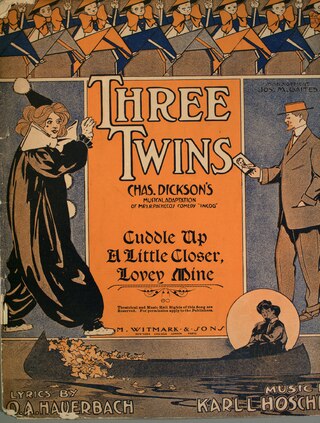
"Cuddle Up A Little Closer, Lovey Mine" is a popular song. The music was written by Karl Hoschna, the lyrics by Otto Harbach. The song was published in 1908. From the Broadway musical Three Twins when it was introduced by Alice Yorke.
"You Brought a New Kind of Love to Me" is a 1930 popular song. The credits list music and lyrics as written by Sammy Fain, Irving Kahal, and Pierre Norman. Since Fain was primarily a music writer and Kahal a lyricist, it may be assumed that the music was by Fain and lyrics were by Kahal, with Norman's contribution uncertain.

"You'd Be Surprised" is a song written by Irving Berlin in 1919 which Eddie Cantor interpolated it into Ziegfeld's Follies of 1919. Cantor soon recorded it and it became a major hit. Other popular versions in 1920 were by the All-Star Trio and by Irving Kaufman.
"I've Got My Love to Keep Me Warm" is a popular song copyrighted in 1937 by its composer, Irving Berlin, and first recorded by (i) Ray Noble, Howard Barrie, vocalist; (ii) Red Norvo, Mildred Bailey, vocalist; (iii) and Billie Holiday with her orchestra. The song – sung by Dick Powell and Alice Faye – debuted on film February 12, 1937, in the musical, On the Avenue.
"Easter Parade" is a popular song, written by Irving Berlin and published in 1933. Berlin originally wrote the melody in 1917, under the title "Smile and Show Your Dimple", as a "cheer up" song for a girl whose man has gone off to fight in World War I. A recording of "Smile and Show Your Dimple" by Sam Ash enjoyed modest success in 1918.
"Isn't This a Lovely Day?" is a popular song written by Irving Berlin for the 1935 film Top Hat, where it was introduced by Fred Astaire in the scene where his and Ginger Rogers' characters are caught in a gazebo during a rainstorm. The lyric is an example of a song which turns a bad situation into a love song, a common style for Irving Berlin, as in "I've Got My Love to Keep Me Warm" and "Let's Have Another Cup of Coffee".
"Now It Can Be Told" is a popular song written by Irving Berlin for the 1938 film Alexander's Ragtime Band, where it was introduced by Alice Faye and Don Ameche. It was nominated for an Academy Award in 1938 but lost out to "Thanks for the Memory".
"Reaching for the Moon" is a popular song written by Irving Berlin for the 1930 musical film of the same name.

Just a Baby's Prayer at Twilight (For Her Daddy Over There) is a 1918 song composed by M.K. Jerome, with lyrics written by Sam M. Lewis and Joe Young. The song was published by Waterson, Berlin & Snyder Co. The song was performed by Henry Burr and reached number one on the top 100 US songs of 1918. Burr's recording sold a million copies in sheet music and sales.
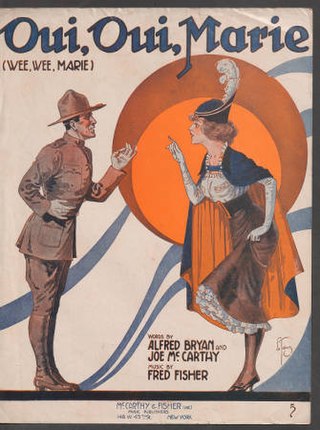
Oui, Oui, Marie is a 1918 song composed by Fred Fisher with lyrics written by Alfred Bryan and Joe McCarthy. It was published by McCarthy & Fisher Inc. The sheet music cover featured an illustration by Andre De Takacs. The song was in the top 20 charts from September 1918 to February 1919 and reached number 10 in December. It was recorded by Arthur Fields, Irving Kaufman, and Rachel Grant & Billy Murray. The sheet music can be found at the Pritzker Military Museum & Library.

Blue Skies is a studio album of phonograph records by Bing Crosby and Fred Astaire released in 1946 featuring songs that were presented in the American musical film Blue Skies. Like Song Hits from Holiday Inn, the entire 78 rpm album would be composed of Irving Berlin songs written specifically for the film. This was the first release of one of Astaire's greatest songs, "Puttin' On the Ritz", on shellac disc record.
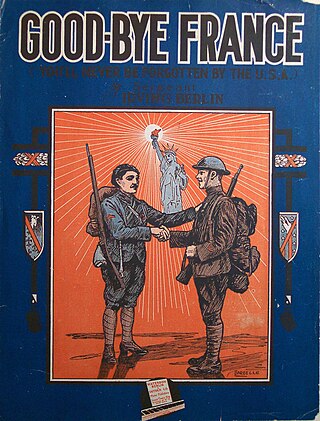
Goodbye, France or "Good-bye France " is a World War I era song written and composed by Irving Berlin and published by Waterson, Berlin & Snyder, Inc., in New York City. The sheet music cover, illustrated by Albert Wilfred Barbelle, features French and American soldiers shaking hands with the Statue of Liberty in the background.

"And He'd Say, 'Oo-La-La! Wee-Wee!'" is a World War I era song released in 1919. Lyrics and music were written by George Jessel and Harry Ruby. William Baker arranged the song. It was published by Waterson, Berlin & Snyder, Inc. of New York, New York. The song was written for voice and piano.
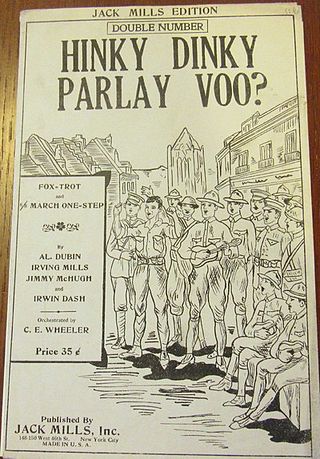
"Hinky Dinky Parlay Voo?" is a song composed by Al Dubin, Irving Mills, Jimmy McHugh and Irwin Dash in 1924 and published by Jack Mills, Inc. It is a sequel to the popular World War I song, "Mademoiselle from Armentières," having the same refrain.

Let's All Be Americans Now is a World War I song written and composed by Irving Berlin, Edgar Leslie, and George W. Meyer. The song was first published in 1917 by Waterson, Berlin & Snyder Co., in New York, NY, appearing in the Broadway musical, 'Dance and Grow Thin'. The sheet music cover depicts a soldier with his rifle and silhouetted marching soldiers in the background. A popular recording in 1917 was made by the American Quartet.













